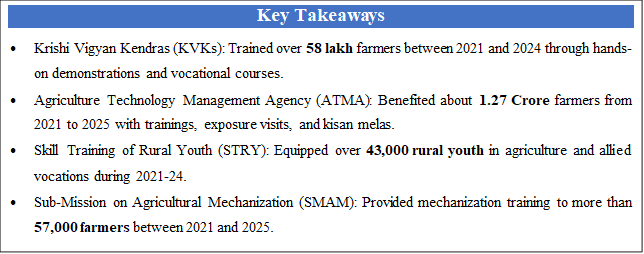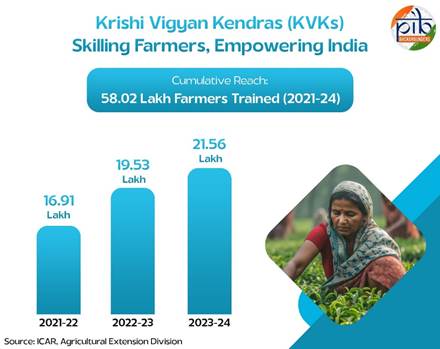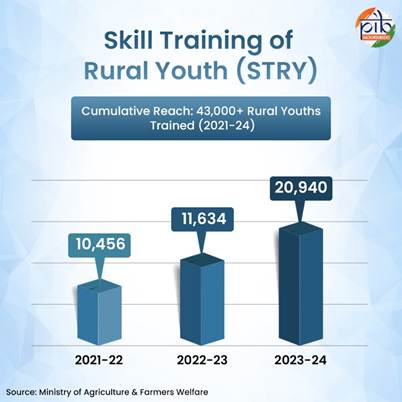Farmer's Welfare
Empowering Farmers through Skill Development and Training
Enhancing Capacities, Enabling Growth
Posted On:
30 SEP 2025 11:13AM

Introduction
Farmer empowerment has emerged as a cornerstone of India’s agricultural strategy. With nearly two-thirds of the population living in rural areas and almost half dependent on agriculture for their livelihoods, strengthening the skills and capacities of farmers is essential for inclusive and sustainable growth. The challenges faced by farmers today go beyond access to credit or inputs; they include adapting to climate variability, managing soil health, embracing mechanization, and securing better market opportunities.
Recognising this, the Government of India has placed skill development and training at the centre of its rural development agenda. Over the past decade, a range of programmes have been launched to equip farmers with practical knowledge, vocational skills, and exposure to modern technologies. These initiatives seek to ensure that farmers are not just cultivators but also innovators, decision-makers, and active contributors to the agri-value chain.
Institutions such as Krishi Vigyan Kendras (KVKs) and schemes like Agricultural Technology Management Agency (ATMA), Skill Training of Rural Youth (STRY), Sub-Mission on Agricultural Mechanization (SMAM), and The Pradhan Mantri Kaushal Vikas Yojana (PMKVY) have built strong training platforms, while sector-specific interventions in horticulture, livestock, soil management, and food processing are integrating skilling into their frameworks. Collectively, these efforts underline a clear vision: empowering farmers through skill enhancement is vital to boosting productivity, raising incomes, and building a resilient agricultural sector.
Building Institutional Platforms for Farmer Training
A strong institutional framework has been created to take skill enhancement directly to farmers, with the Krishi Vigyan Kendras (KVKs) playing a central role. Established by the Indian Council of Agricultural Research (ICAR), KVKs act as frontline extension centres across districts, bridging the gap between research and practice through hands-on training, demonstrations, and vocational courses tailored to local agro-climatic conditions. Between 2021 and 2024, KVKs trained 58.02 lakh farmers, with the outreach steadily rising each year—16.91 lakh farmers in 2021–22, 19.53 lakh in 2022–23, and 21.56 lakh in 2023–24. In 2024–25 alone, up to February 2025, an additional 18.56 lakh farmers had also been trained.
These figures reflect the consistency and scale of the KVK network in empowering farmers with practical skills in crop management, soil health, animal husbandry, and allied activities. By grounding training in local realities while introducing scientific methods, KVKs have become one of the most effective platforms for farmer capacity building, ensuring that scientific knowledge translates into field-level improvements and long-term resilience.

Complementing this, the Agricultural Technology Management Agency (ATMA) has supported states in revitalising their extension systems. This Centrally Sponsored Scheme on ‘Support to State Extension Programmes for Extension Reforms’ popularly known as Agriculture Technology Management Agency (ATMA) is being implemented across the country by the Ministry of Agriculture & Farmers Welfare under the component of Sub-Mission on Agriculture Extension (SMAE). The scheme promotes decentralized farmer-friendly Extension system in the country with an objective to support State Government’s efforts to revitalize the extension system and making available the latest agricultural technologies and good agricultural practices in different thematic areas of agriculture and allied areas to farmers, farm women and youth, through various interventions like Farmers Training, Demonstrations, Exposure Visits, Kisan Melas etc.
In 2021-22, about 32.38 lakh farmers were trained under ATMA. This increased to 40.11 lakh in 2022-23 and stood at 36.60 lakh in 2023-24. For 2024-25, the figures are still being compiled, but by 30 January 2025, nearly 18.30 lakh farmers had already been trained. Overall, from 2021 to 2025, the scheme has reached around 1.27 Crore farmers.
Skilling Rural Youth and Promoting Mechanization
Special attention has been given to preparing the younger generation of farmers for emerging opportunities in agriculture. The Skill Training of Rural Youth (STRY) programme has been designed to impart short-term, skill-based training of about seven days to rural youth and farmers in agriculture and allied sectors. The aim is to upgrade their knowledge, promote wage and self-employment, and create a pool of skilled manpower in villages. Recently, the programme has been subsumed under the ATMA cafeteria, ensuring closer integration with state-led extension efforts.
STRY provides practical vocational training in areas such as horticulture, dairy, fisheries, and animal husbandry, and is targeted at rural youth aged 18 years and above, including women farmers. Over the past four years, the scheme has steadily expanded its outreach. In 2021–22, 10,456 rural youth were trained, rising to 11,634 in 2022–23 and 20,940 in 2023–24. This brought the cumulative number to more than 43,000 youth trained between 2021 and 2024. The momentum has continued in the current year as well, with an additional 8,761 youth trained up to 31st December 2024. By equipping participants with hands-on skills and encouraging entrepreneurship, the programme is building a new generation of skilled and self-reliant farmers who can strengthen rural economies.

The Sub-Mission on Agricultural Mechanization (SMAM), being implemented as a component of the Rashtriya Krishi Vikas Yojana (RKVY), seeks to expand the reach of farm mechanization among small and marginal farmers and in regions with low farm power availability. Its objectives include promoting Custom Hiring Services to address the challenges of small landholdings and high ownership costs, creating awareness through demonstrations, capacity building and IEC activities, and ensuring quality assurance through performance testing and certification at designated centers across the country.
According to official data, the Sub-Mission on Agricultural Mechanization (SMAM) has trained a total of 57,139 farmers during the four-year period from 2021 to 2025.
Strengthening Knowledge on Soil, Resources and Value Chains
The Soil Health Card Scheme has played a vital role in helping farmers make informed choices on crop planning and fertilizer application. As of 24thJuly 2025, more than 25.17 crore soil health cards have been distributed across the country, alongside the organization of over 93,000 farmer trainings, 6.8 lakh demonstrations, and thousands of awareness campaigns. These initiatives have promoted balanced nutrient management practices among farmers, leading to improved soil health and sustainable enhancement of agricultural productivity.
At the collective level, the Formation and Promotion of Farmer Producer Organizations (FPOs) has created new platforms for farmer capacity building. With 10,000 FPOs registered, farmers are receiving regular training through digital modules and webinars on agri-business management, market linkages, and use of digital platforms like e-NAM and GeM.
The government has also embedded skill development within flagship national schemes. The Pradhan Mantri Kaushal Vikas Yojana (PMKVY 4.0) (2022–26) has incorporated agriculture as a priority sector, it integrates agriculture and allied sectors within India’s flagship skilling framework. Through accredited training centres, skill hubs, and PM Kaushal Kendras, farmers and rural youth are trained in short-term courses (300–600 hours), Recognition of Prior Learning, and special projects.
Under the PMKVY scheme, since its inception in 2015 till June 30, 2025, more than 1.64 Crore have been trained and more than 1.29 Crore have been certified.
Like PMKVY, sector-specific interventions such as the Mission for Integrated Development of Horticulture (MIDH), Rashtriya Gokul Mission (RGM), and Pradhan Mantri Kisan SAMPADA Yojana (PMKSY) have dedicated components for capacity building in horticulture, livestock, and food processing respectively.
Mission for Integrated Development of Horticulture (MIDH)
The Mission for Integrated Development of Horticulture (MIDH) is a Centrally Sponsored Scheme aimed at the holistic growth of the horticulture sector covering fruits, vegetables, root and tuber crops, mushrooms, spices, flowers, aromatic plants, coconut, cashew, cocoa and bamboo.
Under Human Resource Development (HRD) Programme, 9.73 lakh farmers have been trained under various horticulture activities from 2014-15 to 2023-24.
Rashtriya Gokul Mission (RGM)
The Rashtriya Gokul Mission (RGM) is being implemented since December 2014 for the development and conservation of indigenous bovine breeds. It is being continued under the umbrella scheme Rashtriya Pashudhan Vikas Yojana for the period 2021-26 with a budget outlay of ₹2400 crore.
Under RGM, Multi-purpose Artificial Insemination Technicians in Rural India (MAITRIs) are trained and equipped to deliver quality artificial insemination services at farmers’ doorsteps and so far,38,736 MAITRIs trained and equipped in the country.
Pradhan Mantri Kisan SAMPADA Yojana
The Pradhan Mantri Kisan SAMPADA Yojana is a comprehensive scheme aimed at developing modern infrastructure for the food processing sector and creating seamless supply chains from the farm gate to retail outlets
Under the Pradhan Mantri Kisan SAMPADA Yojana, one of the seven key components is “Human Resources and Institutions”, which focuses on R&D, promotional activities, skill development, and strengthening of institutions. The Skill Development element under this component is designed to create a sector-specific skilled workforce for the food processing industry, ranging from floor-level workers, operators, packaging and assembly line staff to quality control supervisors, thereby meeting the diverse human resource requirements of the sector and supporting its sustainable growth.
As on June 30, 2025, under various component schemes of PM-Kisan SAMPADA Yojana, 1601 projects have been approved, out of which 1133 projects have been completed benefitting more than 34 lakh farmers in the country.
Conclusion
Skill development is now firmly embedded in India’s agricultural landscape. From hands-on training at KVKs and ATMA’s state-led programmes to sector-specific skilling under PMKVY, SMAM, RGM, and PMKSY, these initiatives are equipping farmers and rural youth with knowledge, confidence, and practical abilities.
By focusing on capacity building, the Government is not only enabling farmers to adopt better practices but also empowering them to become entrepreneurs, agri-business leaders, and key drivers of rural growth. Together, these efforts are laying the foundation for a skilled, self-reliant, and resilient farming community in line with the vision of a Viksit Bharat.
References:
- https://www.pib.gov.in/PressReleasePage.aspx?PRID=2152196
- https://www.pib.gov.in/PressReleasePage.aspx?PRID=2154174
- https://www.pib.gov.in/PressReleasePage.aspx?PRID=2153494
- https://www.pib.gov.in/PressReleasePage.aspx?PRID=2117330
- https://sansad.in/getFile/annex/267/AU508_fOecJc.pdf?source=pqars
- https://sansad.in/getFile/loksabhaquestions/annex/185/AU1520_Snu5qh.pdf?source=pqals
Click here to see PDF
SK/SM
(Backgrounder ID: 155309)
Visitor Counter : 246
Provide suggestions / comments